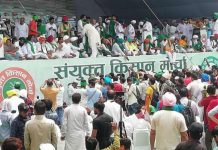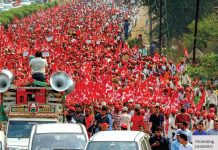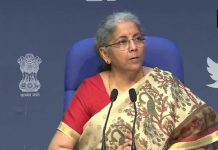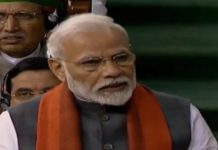The second day of Jan Manch saw an unanimous demand for ensuring better implementation of the PDS
Ajachi Chakrabarti
New Delhi

Photo: Ankit Agrawal
Roundly criticising the proposed National Food Security Bill, a public meeting organised by the Right to Food Campaign and the Pension Parishad called for the universalisation of the public distribution system (PDS) by removing the concept of targeting distribution on the basis of the poverty line.

“The government has created an artificial wall between APL (above poverty line) and BPL (below poverty line) families,” said Prakash Javadekar, spokesperson of the BJP. “Break down this wall!” he said. He underlined his party’s commitment to ensure food security, citing the fact that they kept their promise of not raising the prices of essential supplies while in power in Maharashtra. He promised to make the PDS universal if the BJP was voted into power.
As he left the stage, however, Prof Jayati Ghosh of Jawaharlal Nehru University said that it was the NDA government that created the divide between APL and BPL. “We cannot simply trust the BJP to meet our demands if they come into power,” she said. “The only thing that seems to work is people putting pressure on the government.”
Sharing the stage with Javadekar was Kavita Krishnan, a member of the Central Committee of the CPI(ML) Liberation, who announced that her party would launch a jail bharo andolan against corruption and the food crisis on 31 August. “The government can afford to make the PDS universal,” she said. “Every other day, we hear of new corruption scandals, where they are giving away the wealth of the nation to private companies. Every year during the budget, the government gives tax breaks to rich corporations. If they can afford to pay for the rich, they should be able to pay for our rights,” she said.
CPM leader D Raja expressed the Left Front’s support for the campaign, citing their nationwide campaign for food security. He said that if Parliament was allowed to function, his party would demand the passage of an amended version of the Bill. “Right to food needs to be made a fundamental right,” he said. “There is enough food to feed everyone, but the government lacks the political will to remove starvation and hunger.”
All the speakers criticised the Delhi government’s proposed cash transfer scheme, with Krishnan saying that it would leave people at the mercy of market forces. “Cash transfers are being offered as an alternative where you have failed to deliver something,” said Nikhil Dey of the Mazdoor Kisan Shakti Sangathan (MKSS). “It is the easiest way out of everything. I have failed to deliver education, so I’ll give you cash so you can go find your own school. I have failed to deliver health, so I’ll underwrite your bill to find healthcare in the private sector. This does two things: it helps the private sector and undermines the basic responsibility of the state.”
Dey said that he does not support replicating cash transfers in India, despite their celebrated success in Brazil and Mexico. “I have personally seen both cases,” he said. “Cash transfers need targeting, which has never worked in India. Even Brazil hasn’t succeeded. Only half of those who apply in Brazil get the transfers. They have inspectors who personally go and screen applicants. Imagine doing that in India with 120 crore people. Already with the BPL list, they have made a mess of it,” he added.
He did not see the failings of the PDS in India as a rationale for dismantling it, saying that there were examples such as Chhattisgarh and Tamil Nadu that showed it could work if the system involved the people. “Anything can be made to fail,” he said. He listed universalisation, full transparency, giving people a chance to complain and acting on those complaints as measures to make the PDS work.
‘If watchman is asleep, we should have the right to alert others’
Activists, politicians and journalists voice for protection to be provided to the whistleblower’s family under the Whistleblowers Protection Bill
Ajachi Chakrabarti
New Delhi
“The Constitution says that the people are the masters of this country, and as the masters, we should have all the information on every aspect,” said Mazdoor Kisan Shakti Sangathana (MKSS) co-founder and social activist Aruna Roy at a public meeting in New Delhi on Monday 27 August.
Delivering the valedictory address to the public meeting on the Whistleblowers (Protection in Public Interest Disclosures) Bill as well as the Grievance Redressal Bill, Roy asked the government to take into account all stakeholders before formulating policy, and that without five pillars – information, public hearing, action, people’s participation and security for all complainants – the Whistleblowers Bill would not be effective. She was speaking at a Jan Manch organised by the National Campaign for People’s Right to Information (NCPRI), Inclusive Media for Change and Foundation for Media Professionals and Accountability Initiative at the Constitution Club of India in New Delhi.
Also speaking at the meeting were Dhananjay Dubey, brother of slain whistleblower Satyendra Dubey; Mangla Ram and Bhikham Chand, two RTI activists who were attacked for raising corruption issues; as well as senior journalists and politicians. The speakers flagged a number of issues with the whistleblower protection framework, including its limitation of the definition of whistleblowing to only corruption cases, no protection for a whistleblower’s family and flaws in the definition of ‘complainant’.
Bhikham Chand and Mangla Ram spoke about their experience in facing violence for speaking out against corruption. Chand, who filed an RTI application for his gram panchayat’s financial records, had had both his legs broken by goons allegedly hired by the sarpanch. Ram had also been assaulted for similar activism. All the speakers favoured extending the protection under the law to RTI activists, employees of NGOs, journalists and human rights activists.
Vandana Chavan, a newly-inducted Nationalist Congress Party (NCP) Rajya Sabha MP, promised to make her maiden Parliamentary speech on the Whistleblowers Bill, and said that it was important to highlight cases such as that of Chand and Ram’s, “so that they know they are not alone.” She felt that the law should also hold private agencies accountable, talking about threats she had faced from the land mafia during her tenure as corporator of Pune. Chavan also spoke of threats to her daughter, and underlined that the family of the whistleblower must be protected as well. Kamal Chenoy, a professor at Jawaharlal Nehru University, rubbished the national security exception in the bill, saying that those who expose the excesses of the armed forces, especially in areas where the Armed Forces Special Powers Act (AFSPA) is in force, should also be protected. “If our watchman is asleep, we should have the right to alert other people,” said Aruna Roy in an intervention.
Tehelka Managing Editor Shoma Chaudhury and journalist Aniruddha Bahal spoke about their harrowing experience after highlighting government corruption, while Vinod Mehta, Editor-in-chief of Outlook, said that unless a strong public opinion is built and people stand up and protect the whistleblowers, no law – however well crafted – can work. Senior advocate and anti-corruption activist Prashant Bhushan spoke against the Chief Vigilance Commission (CVC) being the competent authority on whistleblower protection, saying that in the past five years, the CVC had not protected even one whistleblower. He said that since its members were appointed by the government, it was weak and malleable. He said an independent authority was required for whistleblowers’ protection.
The conference also discussed the Grievance Redressal Bill, with organisations that had held grievance redressal camps in Delhi in December coming together and reporting its results. “I live just three kilometres away from the Parliament but we live in such degraded and inhuman condition that for us the Grievance Redress Bill is absolutely essential in order to claim our rights and entitlements as citizens,” said Khursheed of the National Federation for Indian Women. East Delhi MP Sandeep Dikshit, however, held that states did not appreciate the Union government interfering in their internal affairs and that many states had already passed their own grievance redressal mechanisms. Dikshit also offered to start a dialogue between the organisations and the Delhi government.
The MKSS will also organise similar Jan Manch meetings at Jantar Mantar on food security and pensions on 28 and 29 August.
letters@tehelka.com










